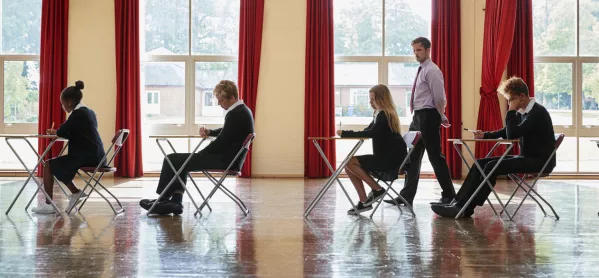Exams 2021: Why the IB’s MYP could inspire GCSE reform

Ever since the pandemic hit and exams around the world were cancelled debate rose up about how we could create new, more modern and resilient forms of assessment.
This debate seems especially relevant as we await the impact of the teacher assessed grades (TAGs) for GCSE and A levels - especially as we hope to avoid the fallout from last year’s centre assessed grades debacle.
What this future of assessment might look like is not yet clear. But, for me, a recent set of other assessment results that somewhat snuck under the radar could offer a blueprint for other exam boards in a post-Covid world: the IB MYP Certificate, the results of which were issued on 1 August.
A new model
Adopted by the IB in 1994, the MYP is relatively new by educational standards and provides a framework of learning for students aged 11-16. Even younger is the MYP Certificate.
First awarded in 2016, it offers students the chance to earn a formal, externally assessed and internationally recognised qualification.
The strength of the MYP programme is the fact that it is built around global concepts, such as innovation, identity and sustainability, providing context and focus for the content that students will learn, engaging them and helping them understand the world around them.
These global contexts are often adopted by international schools delivering other curricula because of their impact on learning.
- Grades: What to expect on GCSEs and A level 2021 results day
- Exlclusive: Fears over gap between state and private school on A level results day
- GCSE results day 2021: How teacher assessed grades got the greenlight
A modern asssessment pacakge
From an assessment point of view, what sets the MYP Certificate apart from other curricula is the fact that subjects are assessed entirely in an electronic format, either through exams or portfolios.
This means it is more resilient to changes (such as a global pandemic) and is also more suitable for students in the 21st century, many of whom never write anything using pen and paper until they enter an exam hall.
The MYP Certificate requires students to complete eight components, each with a top grade of Level 7, resulting in a maximum score of 56 (something fewer than 10 students worldwide achieved).
Online exams in language and literature (native language), mathematics, science, individuals and societies (often called humanities), and an interdisciplinary exam addressing a global issue linking knowledge between a number of different academic subjects, are supplemented by portfolios in language acquisition (a foreign language) and one of PHE (physical and health education), design or the arts.
The final component is the personal project - an individual research task requiring the development and creation of a product.
We need a system for the modern world
Assessments are externally validated, thus adding rigour to the qualification - something many critics of the MYP say is lacking - making it arguably the most demanding qualification available for 16-year-olds to undertake.
The beauty of this system is that students were still able to go ahead with their exams in 2021, despite the fact that their school may have been closed, or the need to self-isolate, or if they had chosen not to attend school to protect other family members.
In addition, the IBO has adapted the assessment for the 2021 exam session, offering an alternative task, reducing the length of the exam in order to reflect the loss of learning throughout the last 18 months.
What’s more, the variety of assessment styles reflects the flexibility that businesses are crying out for from their workforce.
Most educators will agree that the exams system is in need of updating, having barely changed since Victorian times; individually regurgitating content on an exam paper does not reflect the needs of the 21st century when we expect the workforce to work in teams, find solutions to problems that haven’t even been uncovered yet, innovate and safeguard our planet.
Whatever the outcomes of the TAG process in the days ahead, education must be willing to consider new solutions, ideas and assessment types to ensure it evolves with the times.
That’s why, for me, a model that blends portfolio work and exams, that tests a student’s ability to apply content knowledge to a global situation, demands both a breadth of knowledge and subject-specific knowledge and that’s offered digitally should be a good source of inspiration.
Ian Thurston is principal at DIA Emirates Hills, an IB continuum school for children aged 3-18 in Dubai, UAE
You need a Tes subscription to read this article
Subscribe now to read this article and get other subscriber-only content:
- Unlimited access to all Tes magazine content
- Exclusive subscriber-only stories
- Award-winning email newsletters
Already a subscriber? Log in
You need a subscription to read this article
Subscribe now to read this article and get other subscriber-only content, including:
- Unlimited access to all Tes magazine content
- Exclusive subscriber-only stories
- Award-winning email newsletters
topics in this article



